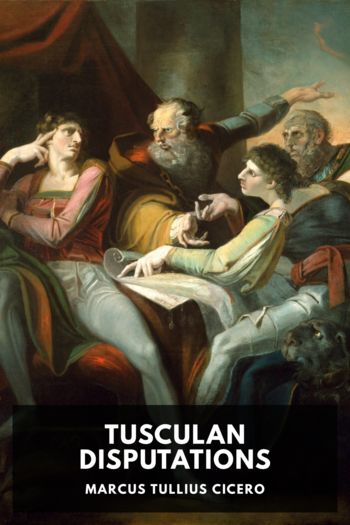Tusculan Disputations - Cicero (red novels TXT) 📗

- Author: Cicero
Book online «Tusculan Disputations - Cicero (red novels TXT) 📗». Author Cicero
We will pass over Dicaearchus,11 with his contemporary and fellow-disciple Aristoxenus,12 both indeed men of learning. One of them seems never even to have been affected with grief, as he could not perceive that he had a soul, while the other is so pleased with his musical compositions that he endeavors to show an analogy betwixt them and souls. Now, we may understand harmony to arise from the intervals of sounds, whose various compositions occasion many harmonies, but I do not see how a disposition of members, and the figure of a body without a soul, can occasion harmony. He had better, learned as he is, leave these speculations to his master Aristotle, and follow his own trade as a musician. Good advice is given him in that Greek proverb,
Apply your talents where you best are skill’d.
I will have nothing at all to do with that fortuitous concourse of individual light and round bodies, notwithstanding Democritus insists on their being warm and having breath, that is to say, life. But this soul, which is compounded of either of the four principles from which we assert that all things are derived, is of inflamed air, as seems particularly to have been the opinion of Panaetius, and must necessarily mount upward; for air and fire have no tendency downward, but always ascend; so should they be dissipated that must be at some distance from the earth. But should they remain, and preserve their original state, it is clearer still that they must be carried heavenward, and this gross and concrete air, which is nearest the earth, must be divided and broken by them; for the soul is warmer, or rather hotter, than that air, which I just now called gross and concrete—and this may be made evident from this consideration: that our bodies, being compounded of the earthy class of principles, grow warm by the heat of the soul.
We may add that the soul can the more easily escape from this air, which I have often named, and break through it, because nothing is swifter than the soul. No swiftness is comparable to the swiftness of the soul, which, should it remain uncorrupt and without alteration, must necessarily be carried on with such velocity as to penetrate and divide all this atmosphere where clouds, and rain, and winds are formed, which, in consequence of the exhalations from the earth, is moist and dark: but, when the soul has once got above this region, and falls in with and recognizes a nature like its own, it then rests upon fires composed of a combination of thin air and a moderate solar heat, and does not aim at any higher flight. For then, after it has attained a lightness and heat resembling its own, it moves no more, but remains steady, being balanced, as it were, between two equal weights. That, then, is its natural seat where it has penetrated to something like itself, and where, wanting nothing further, it may be supported and maintained by the same aliment which nourishes and maintains the stars.
Now, as we are usually incited to all sorts of desires by the stimulus of the body, and the more so as we endeavor to rival those who are in possession of what we long for, we shall certainly be happy when, being emancipated from that body, we at the same time get rid of these desires and this rivalry. And that which we do at present, when, dismissing all other cares, we curiously examine and look into anything, we shall then do with greater freedom. And we shall employ ourselves entirely in the contemplation and examination of things, because there is naturally in our minds a certain insatiable desire to know the truth, and the very region itself where we shall arrive, as it gives us a more intuitive and easy knowledge of celestial things, will raise our desires after knowledge. For it was this beauty of the heavens, as seen even here upon earth, which gave birth to that national and hereditary philosophy (as Theophrastus calls it), which was thus excited to a desire of knowledge. But those persons will in a most especial degree enjoy this philosophy, who, while they were only inhabitants of this world and enveloped in darkness, were still desirous of looking into these things with the eye of their mind.
For if those men now think that they have attained something who have seen the mouth of the Pontus, and those straits which





Comments (0)